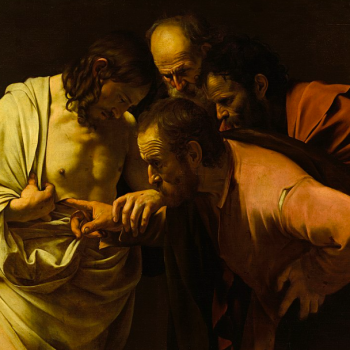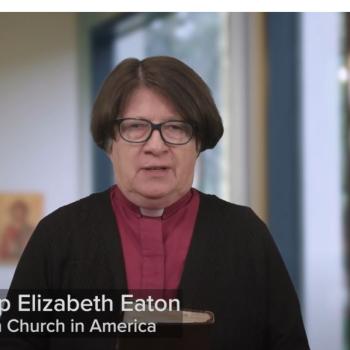And the temptation is always to make it into a neat narrative, instead of to actually pay attention and say: where are the ragged edges in this story? Instead, make it a parable, not a fable. A fable has a point, a single moral, but a parable is like a koan. It just opens up more and more layers of meaning. You can get lost in a parable. It can mean all kinds of things.
I admired the way the book was organized. There was a suspense factor: feeding, healing, all of that made sense, but raising the dead? I kept wondering how you were going to pull that off, literarily or otherwise.
Did that part make sense?
Absolutely, in the way you evoked that liminal space, between life and death...
It ain't a party trick!
Well, I'm not going to give it away, the way you raise the dead -- it's in the book. But I wanted to ask you to say something more about that image of these beautiful sanctuaries, these worship spaces, that are empty, while a soup kitchen, massed with people, operates in the basement below.
That's a really interesting idea about what holiness is. Is holiness the thing that you don't touch? Or is holiness covered with fingerprints?
At St. Gregory's we have the altar in the very center of the church -- and we use it for holding coffee after service. And I'll ask someone to move some furniture, and they'll say, Where's the sacred thing? I don't want to touch it. And it's like, No, the reason you touch it is because it's sacred. And that's what holiness is. Holiness is not hidden away in little pockets; it's everywhere. Your job is to get close to it. You are participating in that holiness by being there. So the altar is not the thing that just the priest touches; the altar is the thing that the meth-head is leaning on. It's strong enough to hold everyone.
What about that feeling people look to religion for, of there being ‘something higher' or something to look up to?
Right. I totally understand that. But I think it's sort of faithless to think that you could break God by touching the altar in the wrong way. Either this is God who made the heavens and the earth -- in which case you spilling coffee on the altar is probably not going to be a big deal -- or God is something really tiny that you're managing.
Do you encounter resistance to this idea, like you're messing with the idea of the sacred? Or of holiness?
What is it that you're desiring? Part of you might be desiring rules, and a schematic way to manage things. But part of you is desiring more God, has glimpsed more, had an experience of more that it's trying to recreate. And that's the job of people who run churches -- to try to listen to that desire, and feed it.
Every Friday you give away free groceries to anyone who comes -- no requirements. You talk about the resistance to simply giving food away.
Well, we feed everybody. We feed the undeserving poor. That to me is one of the great gifts the church can offer. And again, it gets expressed in what people believe. Do people believe that God's grace is for the people who deserve it? Do people believe that in my tradition, communion is for the people who deserve it? Do people believe that the sacramental rite of marriage is for the people who deserve it? Or do you just think: God's grace is everywhere. It's out of control. You actually cannot manage it. God rains on the deserving and undeserving alike.
Your task as a human being who's constantly being remade, more and more, in the image of God, is to imitate that mercy. To give things away to people who don't deserve it. And to understand that you don't deserve it either. I did not deserve communion when I came here. And I got it. I don't deserve it now, just because I've been taking it for a long time. I didn't earn it.
For me the thing that is so deep and profound and radical about communion -- even the cheesiest communion in the church that I have the least in common with -- is that it is a meal you can't buy. In the world, you can buy fifty different kinds of artisanal bread and fancy vintage wine if you have the money. Or you can't, if you don't have the money. But at this table nobody can buy the bread and wine. It's just given away.
And so that is how we run the food pantry. You can't buy it, you can't earn it, you can't deserve it.
You make the point of not making people sign up, or sign in, the way we do if we need government aid.
Right. You don't have to prove anything. The imitation of God's gesture in feeding us all is frightening, and difficult, and exhilarating. It's an amazing experience to do that -- it changes you.
Interesting, too, that the pantry is not run by volunteers from the church, as I had imagined.




